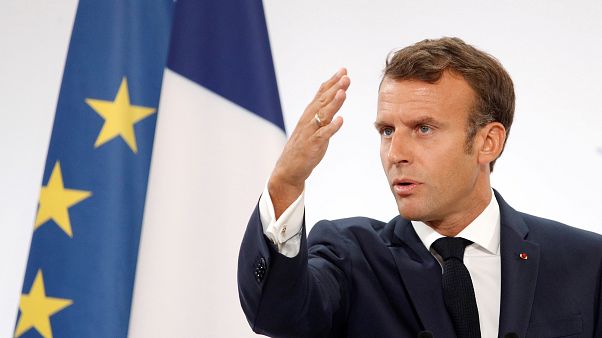Emmanuel Macron: Europe's new shining light or best of a bad bunch?
French President Emmanuel Macron in Paris, France August 27, 2019 -
Copyright
Yoan Valat/Pool via REUTERS
For French President Emmanuel Macron, the G7 summit was undoubtedly a success.
Within two days, he got back into US President Donald Trump's good books, got a boost worldwide for his effort to put the Amazon wildfires at the centre of the closely-watched summit and scored a major diplomatic victory after his gamble to invite Iranian Foreign Minister Javad Zarif to Biarritz seemingly paid off.
The meeting of some of the world's most powerful leaders, held on his home turf, appeared to be the latest, well-calculated move to position himself as the European leader.
"He is certainly today the most active European leader, both in terms of proposals for the EU, but also the one with a message of greater firmness towards Donald Trump," Pascal Boniface, director of France's Institute of International and Strategic Relations (IRIS), told Euronews.
"Finally, he is the one who occupies the most space compared to the relative emptiness around him," he added.
Ode to Joy
The French leader has never hidden his European ambitions. When he approached the stage set up in front of the majestic Louvre pyramid on May 7, 2017, to make his first speech as France's new president-elect, he did so accompanied by "Ode to Joy" — the official anthem of the European Union.
His election was a thumb in the nose to the seemingly unstoppable rise to nationalist movements worldwide as he had campaigned on a vigourously pro-EU agenda.
The monarch of the bloc at the time was Angela Merkel. The German Chancellor, first elected in 2005, had been instrumental in steering the eurozone away from the brink in the aftermath of the global financial crisis.
But the migrant and refugee crisis, which reached its height in 2015, saw her star start at dim at home with humiliating losses at the ballot boxes. Her pledge to not run for re-election in 2021, made to stop the electoral haemorrhage, only highlighted the weakness of her position.
But the German government is not the only one to have gone through political hiccups recently, allowing Macron to fill the vacuum.
"Many of his counterparts are in difficult positions. (Canadian Prime Minister) Justin Trudeau will soon be subjected to elections. There is no government in Italy, and (Britain's Prime Minister) Boris Johnson has only just arrived but must extricate himself from Brexit," Boniface said.
38%
Domestically, it hasn't also been all smooth-sailing for Macron. His government's plan to increase taxes on fuel after it scrapped a tax on wealth sparked the "gilets jaunes" ("yellow vests") protest — the biggest social contestation in the country in decades.
More than 200,000 people joined the first day of national action in November but the weekly rallies were also note-worthy for their violence.
Macron's popularity took a dive and is only just slowly starting to recover. Last month's Ifop/Fiducial poll credited him with only 38% of favourable opinions.
But where he does much better is on foreign affairs with 48% of respondents believing that he defends French interests well abroad.
Beyond his words — his rebuttal of Trump's withdrawal from the Paris Climate Agreement in which he stated that "there is no Planet B" went viral — body language has also played a huge part in his foreign policy.
'They both duel'
He made explicit his Europe-first mentality during a 2017 NATO summit by deliberately swerving away from Trump to greet Merkel first instead.
And when he met Trump on the sidelines of that meeting, Macron held on strong during the handshake so that it was the American leader — who likes to forcefully yank the other person's hands in a show of dominance — who backed down first. The video of their white-knuckle exchange went viral.
Thus began a difficult game for Macron: become Trump's confidant in Europe but still broadcast a firmness.
Trump's visit to Paris for the traditional Bastille Day military parade provided another example.
Javier Torregrosa, an expert in non-verbal communication at NoVerbal.es told Euronews the two leaders fought to project dominance through their greetings — during which Trump invaded his counterpart's personal space — and their prolonged handshake.
"They both duel, pushing with their hands and no one wins until Trump puts a hand to Macron's chest indicating that he's stronger," Torregrosa explained.
Macron has deployed similar tactics with European leaders.
On Brexit — the most pressing issue facing the bloc — he and Merkel have taken a bad-cop-good-cop approach with the French President much tougher in his comments and the Chancellor slightly more conciliatory although the message always stays the same.
During PM Boris Johnson's visit to Paris last week, Macron "repeatedly performed authoritative gestures," Torregrosa said.
These include invading Johnson's space and pronation of his wrist during the handshake.
"This gesture, sought-after by politicians and suggesting dominance, is often done unconsciously. On the other hand, we can see how he touches Boris Johnson's arm with his left hand, once again demonstrating ownership," he continued.
Still, Macron doesn't seem supremely comfortable and "constantly falters, leans to one side and the other" which suggests "a state of nerves and insecurity," according to Torregrosa.
'Crazy'
The G7 was "a demonstration of excellence in our diplomacy," Macron told French ambassadors gathered in Paris on Tuesday.
"So that France is at the heart of these great challenges" facing the world, France must "reinvest bilateral work," Macron urged his diplomatic corp.
He described as "crazy" the fact that no French leaders have visited certain EU member states in decades.
Holding bilateral meetings with fellow EU countries would allow the country the "get some margins of manoeuvring in European issues."
Germany, he flagged, had been more efficient at this.

تعليقات
إرسال تعليق